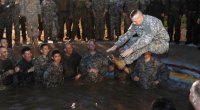John Troxell is passionate about training and improving. He even tracked bodybuilding, powerlifting, and even strongman competitions over the years. A Strongman fan, he was a fan of four-time World's Strongest Man Magnus ver Magnusson. This passion carries over into his training, which occasionally involves lifting and carrying a massive rock he keeps.
"I call it the Husafell Stone," Troxell said, paying tribute to the legendary stone that rests in Magnusson's native Iceland. Obviously, he doesn't consider fitness just a hobby. For him, fitness is a part of who he is and what he does. That's because Army Command Sargeant Major Troxell has spent most of his life keeping in shape for himself and most importantly as the leader of many brave people who have served in the US Army.
Courtesy of John Troxell
John Troxell began his career when he enlisted in the Army on September 1, 1982. He remembered the date like it was his own birthday because it meant so much to him. He was aware of the importance of his commitment very early on. That importance grew even more after he joined the 82nd Airborne Division at Fort Bragg, rth Carolina. He received orders for his first tour of combat duty. Troxell would be part of Operation Just Cause. As a skydiver, Troxell had to jump from airplanes to places where his services were needed. That made his dangerous job even more dangerous.
"We jumped out of the plane, landed where we landed and had to get to work straight away," he recalls. “I already understood the magnitude of my work before I went on this mission, but when I embarked on a real combat tour for the first time, it took me to a new level.
Troxell shared that he eventually decided he needed to turn his ministry into a long-term career. In his 37-year career, he would see four more combat missions, including one on Operation Desert Storm, two on Operation Iraqi Freedom, and one on Operation Enduring Freedom. During his tours, he found that training and staying in superior shape not only helped him prepare optimally personally, but also helped him as a leader. The soldiers in his charge noticed what he was doing and followed him. Troxell was the embodiment of the phrase "lead by example."
"They would see what I was doing that morning and they would take over the same workouts. They wanted to keep up with me every day because they knew I would keep up for them. That's why they wanted to do their best for me too.”
John Troxell even used this passion to train to a higher level by competing in amateur bodybuilding shows. While enjoying both the process and the stage experience, he eventually found that the need to look his best on duty was more important than symmetry and proportion.
"I've done my thing on stage and I've got a few trophies. I've never won a show and have come second twice, but training for performance and for my work on the ground required a different kind of focus and discipline."
Eventually, at the end of his career, he was appointed third Senior Enlisted Advisor (SEAC) to the Chairman of the Joint Chiefs of Staff. He held this position from December 2015 until his retirement
in December 2019. A career spanning 37 years is a lot of time to sum up in simple words, but when asked how Troxell managed not only to survive but to thrive in his diverse roles, he wrote three letters to.
"I call it PME Hard - physically, mentally and emotionally tough," he explained. We need to train ourselves physically, mentally and emotionally to be as prepared as possible for the worst possible situations. The people who accompanied me on these tours and those I guided needed me to do my best and vice versa. So I made sure to train as hard as possible in all facets. So I used weights, ran with backpacks, and found ways to make tasks harder so I could get better.”
 Courtesy of John Troxell
Courtesy of John Troxell
Although he no longer wears the uniform, Troxell maintains this PME mentality and would like others to adopt this philosophy now and in the future. vember is National Military Fitness and Wellness Month - a month designed to help raise awareness of the importance of health and fitness for both active retired military personnel. This is one thing Troxell can talk to, and he hopes to inspire others by telling his story. Although he has now been out of service for three years, he still does his best to lead by example.
"It's very important for my brothers and sisters in ministry to continue to take care of themselves because we can be the next example for the next generation," he shared. "Our country is facing recruiting problems today, and there aren't that many future recruits who meet the standards that we need."
Many veterans have become less consistent with their fitness routines because they are focusing on other areas of life or simply want to go beyond what they were previously doing. They may also feel like they can't handle their injuries, so live with them. Troxell disagrees with this view, and he thinks it's important for veterans to strive for improvement for another reason. As hard as they've worked to protect our freedom, they should be able to enjoy it themselves.
"Our commitment to ourselves no longer needs to be as intense as it is on active duty, but we still owe it to ourselves, our families and our communities to do whatever it takes to be here. We won't live forever, but that doesn't mean we can't try to live forever, or at least as long as possible so we can reap the rewards we've received for what we've done to protect our freedom to protect."

